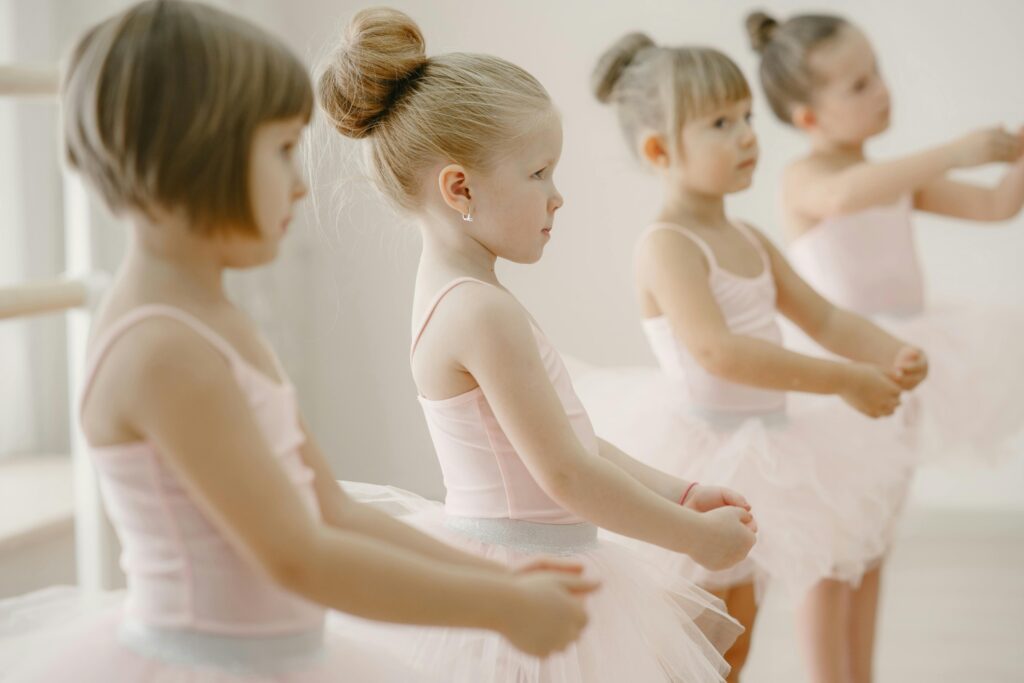Dance is more than learning steps to music. For children, it can be a powerful tool for building focus and discipline, skills that are useful in school, sports, and everyday life. Through regular practice, structured routines, and creative challenges, dance teaches children how to concentrate, set goals, and work hard to achieve them.
Building Focus Through Dance Practice
One of the first lessons children learn in dance is how to pay attention. Whether they are following the teacher’s instructions, watching a demonstration, or listening to the music, they must stay present and engaged. Dance classes often require children to memorise sequences of steps, which helps train their memory and ability to focus for more extended periods.
As children progress, they begin to understand that each movement has a purpose and needs their full attention. They learn to block out distractions, concentrate on their technique, and listen carefully to corrections. This kind of focus can transfer to other areas of life, such as studying for school or completing a task at home.
Discipline Through Structure and Routine
Dance classes usually follow a set structure, starting with warm-ups, moving to skill practice, and finishing with a routine or cool-down. This consistency teaches children to follow a schedule and understand the importance of each stage of the process. Over time, they develop self-discipline by arriving on time, wearing the proper uniform, and mentally preparing for class.
Learning dance also requires practice outside of class. Children who commit to practising at home build self-motivation and learn the value of putting in effort to improve. They begin to see that progress takes time and dedication, a lesson that will benefit them throughout their lives.
The Role of Goal Setting in Dance
Dance provides natural opportunities for goal setting. This may include mastering a new step, improving posture, or preparing for a performance. By working toward these goals, children learn how to break tasks into smaller steps and stay committed until they succeed.
Achieving these goals brings a sense of pride and reinforces the idea that hard work pays off. It also teaches patience, as children realise that not everything can be learned quickly.
Learning to Handle Feedback
Feedback is an essential part of dance training. Teachers guide students with corrections to help them improve. For children, learning to accept and apply this feedback is a valuable skill. It teaches them to see feedback as a way to grow, not as criticism. This builds resilience and the ability to adapt, both of which are essential for success in many areas of life.
Teamwork and Respect for Others
While focus and discipline are often personal qualities, dance also teaches children how to work as part of a team. In group routines, each dancer must concentrate not only on their movements but also on how they fit into the whole performance. This encourages them to listen, cooperate, and respect the efforts of others.
Respect is also shown through following the teacher’s instructions, looking after the dance space, and supporting fellow dancers. These habits help create a positive learning environment where everyone can thrive.
Overcoming Challenges and Building Resilience
Dance is not always easy. There will be times when a step feels too complicated or a performance does not go as planned. Learning to keep going despite these challenges teaches children perseverance. They start to understand that setbacks are part of learning and that progress comes from consistent effort.
This resilience is a big part of discipline. Children learn that improvement is not about being perfect right away, but about showing up, trying again, and not giving up.
Creativity and Concentration Working Together
Although dance requires discipline, it is also a form of creative expression. Balancing creativity with focus is a skill that children can carry into other areas of life. When working on choreography, they must think about timing, movement, and expression all at once. This kind of multitasking sharpens their mental skills while still allowing room for personal style and creativity.
Long-Term Benefits Beyond the Dance Studio
The focus and discipline learned through dance do not stop at the studio door. Children often find that these skills help them in school, sports, and hobbies. They may become better at managing their time, staying organised, and working towards personal goals.
Parents and teachers also notice that children who dance often develop a strong work ethic. They are more willing to take on challenges, manage their responsibilities, and stay committed to their activities.
Conclusion
Dance is a fun and engaging way for children to develop focus and discipline. Through structured lessons, goal setting, regular practice, and teamwork, young dancers build habits that will serve them well in many areas of life. By learning to stay focused, work hard, and overcome challenges, they gain skills that go far beyond dance.
Kew School of Dance offers a supportive environment where children can grow both as dancers and individuals. Our classes are designed to build not only strong dance skills but also confidence, discipline, and a love for learning. To find out more about our programs, contact us at 03 9123 8458 or 0410 311 008.








